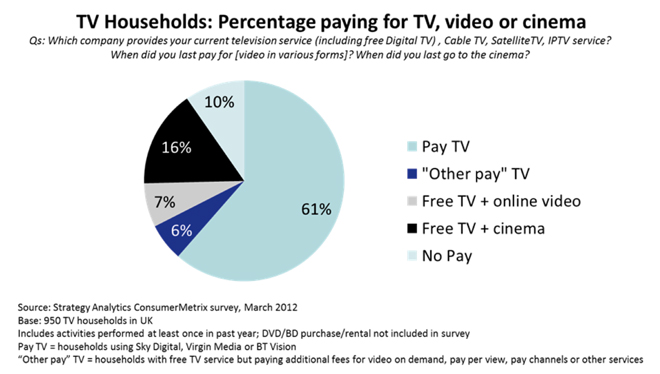Europe's online source of news, data & analysis for professionals involved in packaged media and new delivery technologies
90% of UK households pay for TV, video or cinema

At the recent eForum conference on free versus pay TV a number of speakers noted, including Sky's Adam Kinsley, Head of Policy, the lines between pay and free are increasingly blurred. And if we broaden the question to consider people who pay in any way for video or television content, we can see that 'pay TV' in the traditional sense is only one part of the story, albeit a very important one, explains DAVID MERCER, Principal Analyst at Strategy Analytics.
Our own ConsumerMetrix data suggests that only 10% of UK households have not paid for any form of television, online video or cinema visit during the past 12 months. We have segmented the UK TV household base into those who use a traditional pay TV service (61%), and those who take a free TV service (typically Freeview, and a smaller number of FreeSat), but say that they also make some form of additional payments for television, which might include pay-per-view, additional subscriptions or other services (6%).
We are left with 33% of homes who say they use only 'free TV', but 7% are accounted for by people who also go online to buy video services, and another 16% who visit the cinema. These figures allow for people who have performed these activities at least once during the past year.
This survey did not include purchase or rental of DVD or Blu-ray discs, so the 10% estimate may be even lower if these were included. On the other hand, like most surveys, we are only including households with internet access: if we expanded to these households, which are presumably less likely than average to pay for television services, and by definition would not be using online video, the overall picture might shift a little towards genuine free-only households.
Nevertheless the point seems clear: many households are paying for video and television content in a number of ways, even if they prefer not to subscribe to a traditional pay TV service. The inclusion of cinema may be stretching the point a little, since the theatre experience cannot easily be replicated in-home, although this might suggest that there should still be growth potential in the home pay movies market if the experience can be improved.
Sky's new Now TV service, which launches in the near future, is clearly targeted at many of these pay TV refusenik households which nevertheless have money to spend on video services.

Contact: www.strategyanalytics.com
...
On predicting the future

Predicting the future, let alone the future of packaged media, is a perilous exercise, and possibly counter-productive, as the exercise closes doors rather than keep them open, argues JEAN-LUC RENAUD, DVD Intelligence publisher. Consider that: Apple was left nearly for dead 15 years ago. Today, it became the world's most valuable technology company, topping Microsoft.
Le cinéma est une invention sans avenir (the cinema is an invention without any future) famously claimed the Lumière Brothers some 120 years ago. Well. The cinématographe grew into a big business, even bigger in times of economic crisis when people have little money to spend on any other business.
The advent of radio, then television, was to kill the cinema. With a plethora of digital TV channels, a huge DVD market, a wealth of online delivery options, a massive counterfeit underworld and illegal downloading on a large scale, cinema box office last year broke records!
The telephone was said to have no future when it came about. Today, 5 billion handsets are in use worldwide. People prioritize mobile phones over drinking water in many Third World countries.
No-one predicted the arrival of the iPod only one year before it broke loose in an unsuspecting market. Even fewer predicted it was going to revolutionise the economics of music distribution. Likewise, no-one saw the iPhone coming and even fewer forecast the birth of the developers' industry it ignited. And it changed the concept of mobile phone.
Make no mistake, the iPad will have a profound impact on the publishing world. It will bring new players, and smaller, perhaps more creative content creators.
And who predicted the revival of vinyl?
(click to continue)... Read More...



















